Currently reading

"Chussled". It's a lovely word.
As in, , "The leaves of the lupins chussled like the turning pages of a glossy magazine."
Descriptions are precise, unexpectedly shining light on small details, illuminating the reality. The reality is mundane and unforgiving, but Moore portrays her characters with sympathetic understanding.
Slaney is a man helplessly caught in his own stupidity. He got caught trying to smuggle marijuana into Newfoundland. Very little in the book actually took place in Newfoundland, but fog and boats still got squeezed in there. He gets out of jail in 4 years, and promptly embarks on renewed plans to smuggle in an even bigger haul of weed. Slaney never really seems to get that he is his own architect of folly. He was caught once, and swore they -- the system -- wouldn't break him. "He would not betray the innermost thing. He didn’t know exactly what the innermost thing was, except it hadn’t been touched in the four years of incarceration. Come and get me. They couldn’t get him. It fluttered in and out of view, the innermost thing, consequential and delicate." He is determined not to get caught again, but simultaneously believes getting caught again is inevitable.
Lisa Moore's writing is such a pleasure to read. She has an easy and friendly relationship with words. They get along well.
 1
1
 These voices come from the same neighbourhoods as [a:Roddy Doyle|10108|Roddy Doyle|http://d202m5krfqbpi5.cloudfront.net/authors/1195236672p2/10108.jpg]'s and [a:Agnes Owens|108420|Agnes Owens|http://d202m5krfqbpi5.cloudfront.net/authors/1312630005p2/108420.jpg]'s. They are the working class of an Irish village, suffering the ongoing effects of the financial crash of the last few years. Each short chapter is in the voice of a different character, chatting to you, explaining or describing recent events in the village in the context of their own lives.
These voices come from the same neighbourhoods as [a:Roddy Doyle|10108|Roddy Doyle|http://d202m5krfqbpi5.cloudfront.net/authors/1195236672p2/10108.jpg]'s and [a:Agnes Owens|108420|Agnes Owens|http://d202m5krfqbpi5.cloudfront.net/authors/1312630005p2/108420.jpg]'s. They are the working class of an Irish village, suffering the ongoing effects of the financial crash of the last few years. Each short chapter is in the voice of a different character, chatting to you, explaining or describing recent events in the village in the context of their own lives. The reader is surrounded by a constant overlapping and at times jarringly different perspectives on key incidents. The characters speak as if they already know the reader, as if they are talking directly to you in the local pub. They are simultaneously optimistic but realistically pessimistic about their lives. Some of them are funny -- "My father still lives back the road past the weir in the cottage I was reared in. I go there every day to see is he dead and every day he lets me down." -- others are spitefully mean and selfish. Ryan has superbly captured the voices.
“There’s a red metal heart in the centre of the low front gate, skewered on a rotating hinge. It’s flaking now; the red is nearly gone. It needs to be scraped and sanded and painted and oiled. It still spins in the wind, though. I can hear it creak, creak, creak as I walk away. A flaking, creaking, spinning heart.”
The spinning heart is the hope and the reality of this Irish village.
 1
1
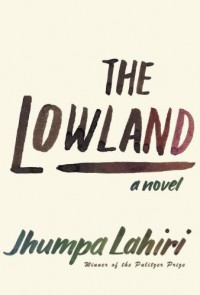 Two brothers, born in India before partition, come of political age in the 1960s. One brother becomes politically active, the other doesn’t, and their lives unfold in completely disparate ways. Tragedy is inevitable, and families struggle to readjust and heal. Some adjust better than others.
Two brothers, born in India before partition, come of political age in the 1960s. One brother becomes politically active, the other doesn’t, and their lives unfold in completely disparate ways. Tragedy is inevitable, and families struggle to readjust and heal. Some adjust better than others.The word ‘Potentially’ should have preceded the publisher’s blurb of “Suspenseful, sweeping, piercingly intimate”, because the opportunities to create that kind of story were squandered. There was a rich substrate to mine: the struggles of the Bengali communist party, the reconciliation of politics with the realities of everyday family life, immigration and integration, grief and its effects, and the evolution of people as they grow from youth to middle age to their winters. None of these were explored; they were merely described.
The book spans over fifty years of the adults’ lives, yet fails to recognise that people change as they age. We are not the same in late middle age as we were in early adulthood. We mature, we acquire wisdom (of varying degrees, it’s true, some acquire a lot more than others), we gain insight into complex matters. This is the byproduct of enduring, surviving, aging. But Lahiri’s characters don’t evolve, so they don’t seem real; they remain static, dooming the reader to boredom.
This is a book of promise unfulfilled. It was the last of the Booker shortlist that I read, and it was the weakest.
 The setting is in the gold rush days of 19th century New Zealand. There is an intricate plot and a theatrical cast of characters whose passions, motivations, and desires bounce and reflect off each other in a dizzying kaleidoscope. But it is the method of spinning the story that has synergistically bumped up the complexity. Why choose A+B+C=D when E=MC2 can be so much more fun to work with? Or in this case, the architecture of astrology. “I previously had a rudimentary understanding of how astrology works,” the author says. “But I became really taken with the idea that what it is fundamentally about is there is no truth except for truth in relation: nothing is objectively true, something is only true compared to something else.” (From an interview with Tom Tivnan at WeLoveThisBook.com)
The setting is in the gold rush days of 19th century New Zealand. There is an intricate plot and a theatrical cast of characters whose passions, motivations, and desires bounce and reflect off each other in a dizzying kaleidoscope. But it is the method of spinning the story that has synergistically bumped up the complexity. Why choose A+B+C=D when E=MC2 can be so much more fun to work with? Or in this case, the architecture of astrology. “I previously had a rudimentary understanding of how astrology works,” the author says. “But I became really taken with the idea that what it is fundamentally about is there is no truth except for truth in relation: nothing is objectively true, something is only true compared to something else.” (From an interview with Tom Tivnan at WeLoveThisBook.com) Twelve characters are based on signs of the zodiac, and several others are “planetary” characters. Just as astrology (which incidentally Catton regards as “silly”), represents the interaction of the planets and constellations, so goes the course of the story. Nothing is true except when compared to something else. (See Aaron's great review about the role of the astrology: http://www.typographicalera.com/luminaries-eleanor-catton/ ).
But this is a framing device well cloaked in the Victorian story-telling style. It is an old-fashioned yarn, taking part in the ‘olden days’, and is replete with reprobates, whores, greedy graspers, moralising bigots, and a fair share of pompous white guys representing the self-regarding pillars of society. One Maori fella (a surprisingly minor role for the Maori in this tale) and a couple of Chinese characters from Chinatown round out the cast. Someone dies, by fair or foul means? And who gets his gold?
The characters’ psychologies are richly drawn: “Moody was not unaware of the advantage his inscrutable grace afforded him. Like most excessively beautiful persons, he had studied his own reflection minutely and, in a way, knew himself from the outside best; he was always in some chamber of his mind perceiving himself from the exterior.”
Of the town whore Anna, and her clients: “If they spoke at all, they spoke about other women—the sweethearts they had lost, the wives they had abandoned, their mothers, their sisters, their daughters, their wards. They sought these women when they looked at Anna, but only partly, for they also sought themselves: she was a reflected darkness, just as she was a borrowed light. Her wretchedness was, she knew, extremely reassuring.” Anna knows that ‘A woman fallen has no future; a man risen has no past.’
It is the exceptional psychological portraits and lyrical prose which elevates this beyond a Victorian murder mystery dressed up in a gimmicky device.
It is a stellar achievement.
 1
1
 The author of We Need New Names chose her own new name for her writing. ‘NoViolet’ is a tribute to Elizabeth Tshele’s mother Violet, who died when Elizabeth was only 18 months old.
The author of We Need New Names chose her own new name for her writing. ‘NoViolet’ is a tribute to Elizabeth Tshele’s mother Violet, who died when Elizabeth was only 18 months old.She also chose interesting names for some of the characters in this book set in Zimbabwe. The story is a first person narrative by Darling, beginning at about age 10. Her close friends include Bastard, Chipo, Godknows. Her grandma is Mother of Bones. They live in Paradise; in the first chapter Hitting Budapest (which won the Caine African Short Story contest a couple of years ago), Darling and her friends are going to the rich area (village? neighbourhood?) of Budapest. They are looking for guavas to steal and eat (it reminded me as a kid sneaking into the nearby church yard with a couple of friends to steal crabapples from the trees. Somehow the tart fruits tasted better when the adrenaline was surging and the heart was palpitating with fear.) Their antics are brought up short by a white woman who calls to them from her house, and then comes outside to talk with them and take photos. The kids are uncomfortable — who is this person? The peculiar encounter is described with just the right level of unease, of a bit of a culture tangle. The shocking ending to that chapter sends a warning about what may come later.
Darling is written as a strong dynamic voice. She’s not a creation; she is there, existing, right there on the page, talking to you. She’s tough, she’s funny, she’s opinionated. Especially powerful are scenes where Darling and her friends meet up with Westerners, usually expats or from NGOs, and later in America. The familiar tv scene of the NGO truck arriving in some African village to dispense aid and goodies to throngs of shouting black kids is turned inside out, or flipped around, and it is funny as well as unsettling and thought provoking.
The novel is a collection of discrete events, almost linked short stories. Many of the chapters stand on their own. As the character gets a bit older, several short chapters become more introspective, and serve more as the role of chorus.
There’s a lot here — coming of age, colonialism, AIDS, immigration, assimilation — but somehow it knits wells together, and Darling’s voice always stays strong.
I hope to see this one on the Booker shortlist.
 1
1
 Halfway through this novel it dawned on me that this could be interpreted as a deeply allegorical story (I'm slow on the uptake). Despite being set in olde England, when witchery and pillorys were believed in (when convenient), it could be a story of politics and class in America today. Behaviours don't change over the centuries - every generation starts afresh and tries to figure it out on their own. The one thing we are remarkably adept at is rationalising away our moral shortcomings--a skill quickly evidenced by the first-person narrator in this story. It's a remarkable tale of the emotions, behaviours and dependent interactions of the inhabitants of a small village, their fates foretold by their class and economic status.
Halfway through this novel it dawned on me that this could be interpreted as a deeply allegorical story (I'm slow on the uptake). Despite being set in olde England, when witchery and pillorys were believed in (when convenient), it could be a story of politics and class in America today. Behaviours don't change over the centuries - every generation starts afresh and tries to figure it out on their own. The one thing we are remarkably adept at is rationalising away our moral shortcomings--a skill quickly evidenced by the first-person narrator in this story. It's a remarkable tale of the emotions, behaviours and dependent interactions of the inhabitants of a small village, their fates foretold by their class and economic status.Cruelty and power are the ways of entropy to which life naturally drifts.
This is longlisted for the Booker, and will be a good contender for the shortlist.
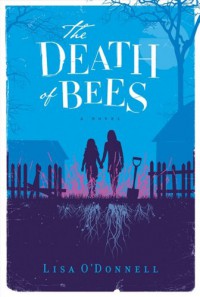 [b:Lullabies for Little Criminals|22207|Lullabies for Little Criminals|Heather O'Neill|http://d202m5krfqbpi5.cloudfront.net/books/1327893204s/22207.jpg|23263] meets [b:The Cement Garden|9957|The Cement Garden|Ian McEwan|http://d202m5krfqbpi5.cloudfront.net/books/1166111732s/9957.jpg|1189398].
[b:Lullabies for Little Criminals|22207|Lullabies for Little Criminals|Heather O'Neill|http://d202m5krfqbpi5.cloudfront.net/books/1327893204s/22207.jpg|23263] meets [b:The Cement Garden|9957|The Cement Garden|Ian McEwan|http://d202m5krfqbpi5.cloudfront.net/books/1166111732s/9957.jpg|1189398].The horrible alcoholic parents of two young teenage girls die within a day of each other, one by the hand of his wife, and then the wife by her own hand out in the garden shed.
Their children have little sympathy for the deaths. Their life of neglect and abuse have toughened them, and they know that if the authorities become aware of the loss of their parents then they will be taken into 'care' by the social services, a highly undesirable result. So after being prompted by the smell and mess of progressive decomposition, they bury the dead in the garden. Under the lavender. It is a gruesomely funny scene.
The story is told in alternating voices of the two sisters and their old gay neighbour who becomes entwined in their lives. The voice of the older sister is convincing; she is teenagerly-tough and funny and still vulnerable. Other characters become interesting when they turn out differently from our preconceptions.
Despite the nature of the story, it's surprisingly light and funny. A good summer read.
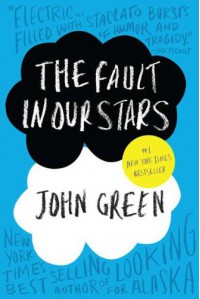 This is the new all-time favourite of my 13yo daughter. "Mom, you've just GOT to read this!" Throughout the evening, she kept glancing sideways at me, looking to see if my tears were leaking yet, especially if I got sniffly. She fist pumped in victory when a few got squeezed out at the end.
This is the new all-time favourite of my 13yo daughter. "Mom, you've just GOT to read this!" Throughout the evening, she kept glancing sideways at me, looking to see if my tears were leaking yet, especially if I got sniffly. She fist pumped in victory when a few got squeezed out at the end.This is such a great book for her. It captures the innocence of the early-mid teenage years, and how it crashes into cruel reality, and also how youthful innocence and optimism can still rescue the mess.
Green has created likeable smart characters, who are a bit nerdy and preternaturally verbally gifted. I kept thinking of the movie 'Juno'. They are witty, funny, charming and they love books. My daughter squealed with delight when one of the characters quoted the opening lines of T.S. Eliot's The Love Song of J. Alfred Prufrock. She recognised it immediately, because I have quoted them to her since she was a toddler, on many many nights when I was ushering her to bed: "Let us go then, you and I, When the evening is spread out against the sky..."
Of course the book is manipulative and a bit sentimental (in a smart-ass kind of way) -- it's impossible not to be, when the story is of kids and cancer. But at least it doesn't take on the more common syrupy tones of oh-look-how-brave-these-poor-kidswithcancer-are, but instead allows the characters to practice teenagery sarcasm as a best defense.
The pacing of the book is remarkably even throughout. It is going to make a hit movie, I think. Love, threat of death, allure of sex, charming funny characters. What's not to like?
 2
2
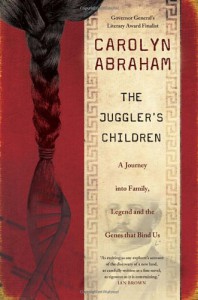 I was an avid genealogist for several years, a while ago. Many nights I'd be up until 2 am, despite having to get up for work in only 5 hours, because I'd be "on a roll". I'd be uncovering a stream of information about newly discovered ancestors, going farther and farther back. One line even got traced back to the tenth century. The key was hitting European nobility in your lines - once you found that, you were in through the door to a rich world of intricate genealogy that was often well documented.
I was an avid genealogist for several years, a while ago. Many nights I'd be up until 2 am, despite having to get up for work in only 5 hours, because I'd be "on a roll". I'd be uncovering a stream of information about newly discovered ancestors, going farther and farther back. One line even got traced back to the tenth century. The key was hitting European nobility in your lines - once you found that, you were in through the door to a rich world of intricate genealogy that was often well documented. "Brick walls", in which no further progress could be made on a particular line, became more and more common as I exhausted the on-line sources. It was the lure of the 'Eureka!' moment that propelled me. Carolyn Abraham in this book compares this to the addicting playing of slot machines. Every once in a while you are rewarded with celebratory bells and whistles and a few coins, and this encourages you to keep playing. Nothing beat the immense satisfaction of solving a mystery. In one instance, I was able to 'find' a long-lost relative who disappeared in the 1830s, never to be seen again by his family in England. The scoundrel had absconded to Canada and set up house with a new wife and family, but the link was never found until the 21st century. The descendants of his English family were gobsmacked when we made contact. They always wondered what happened to him. Sweet.
So I really get this story. Tracing the genealogy of her own family with roots in China, Jamaica, India, England...it seems to be not possible. But Abraham is a journalist with a good science background and the requisite degree of obsessiveness. It takes many many hours of patient searching through online archives, databases, old newspapers, genealogy trees to find just snippets of relevant information. Then she started to also use the information gleaned from genetic analysis of buccal swabs of family members. Genetic genealogy has become big business in the last few years. DNA analysis sometimes helps to break down the brick walls.
This was a fascinating description of how she was able to use this technology, and its pitfalls and limitations.
But she keeps the emphasis on solving the mysteries of her family tree, and muses about the ethics of genetic digging (many people think some things are best left undisturbed; 'false paternity', is said to be about 10% -- your dad may not be your dad).
A fascinating and unusual account of what it means to be a family.
 “Perhaps all the dragons in our lives are princesses who are only waiting to see us act, just once, with beauty and courage.”
“Perhaps all the dragons in our lives are princesses who are only waiting to see us act, just once, with beauty and courage.”It feels quite trite to say this slim collection is inspirational.
But there you go.
It is.
 1
1
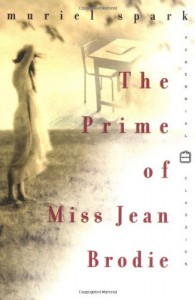 The Prime of Maggie-Smith-as-Miss Jean Brodie is what I really read. Having seen the movie first, it was impossible to disentangle the movie images from the book. The book felt surprisingly slight, but some delightful scenes nonetheless.
The Prime of Maggie-Smith-as-Miss Jean Brodie is what I really read. Having seen the movie first, it was impossible to disentangle the movie images from the book. The book felt surprisingly slight, but some delightful scenes nonetheless.
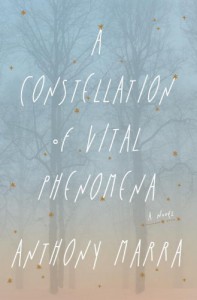 Anthony Marra said that he wrote the kind of book that he wanted to read. His interest in the Chechnyan region was stimulated by spending university time in St Petersburg, shortly after the assassination of a Russian journalist who wrote extensively about the Chechen wars. Novels about the Chechnyans don't exist, so he wrote one. He said he didn't want to write about the policies, the history, the politics, but about the people, the civilians.
Anthony Marra said that he wrote the kind of book that he wanted to read. His interest in the Chechnyan region was stimulated by spending university time in St Petersburg, shortly after the assassination of a Russian journalist who wrote extensively about the Chechen wars. Novels about the Chechnyans don't exist, so he wrote one. He said he didn't want to write about the policies, the history, the politics, but about the people, the civilians. The novel opens with "On the morning after the Feds burned down her house and took her father, Havaa woke from dreams of sea anemones." Havaa is eight years old, her father has been 'disappeared', and the next five days of trying to save Havaa from a similar fate span the book, buttressed by memories and accountings from various times in the previous ten years.
The story is unwound from different spools, and these are picked up and slowly woven together. The prose is often graceful and poetic, elevating the story above a mere war novel.
"Their embrace didn’t break off so much as dissipate, an exhalation releasing whatever tenderness was briefly held between them. His father’s hug was an act of precaution rather than love, so that if Ramzan did not return from the mountains, his father would have the consolation of knowing his final gesture toward his son had been one of kindness rather than disappointment."
Marra's often beautiful prose and insightful scenes belie his youth. (He tweets that despite his 28 years, he has a lot of gray hairs.)
Some events are described a couple of times, each from a different perspective of different characters. It is a sobering reminder that one shouldn't be judgmental - knowledge of the backstory may change your mind.
The novel shows immense compassion towards its characters. There is also humour (frequent), and love (not schmaltzy), and revenge. It is, after all, about Life.
"Life" is defined as "a constellation of vital phenomena" in the Russian medical dictionary of one of the characters. A 'constellation' is an apt description of the construction of these events and how they relate to each other. In this book, Life is also very much the successful avoidance of Death. That is no easy task in this world of double-crossing, back-stabbing, greedy careless cruelties, so retaining Life becomes a phenomenal accomplishment too.
Like this book.
 Lurid post-it notes jostle pink-yellow-red-blue-green post-it flags at the page edges. I think only the five-star ones merit this number of flags. And — (sigh) — Barnes’s essays on writers and their books has bumped up my TBR count. At least I can re-use the post-it flags for those new ones.
Lurid post-it notes jostle pink-yellow-red-blue-green post-it flags at the page edges. I think only the five-star ones merit this number of flags. And — (sigh) — Barnes’s essays on writers and their books has bumped up my TBR count. At least I can re-use the post-it flags for those new ones. Preface: A Life with Books (5*) — This eleven-page essay was one of my favourites. I love reading about other people’s love affairs with books, about how and what they read as children, what ensared them, about how they grew up in their reading tastes, about their influences and favourite authors.
He starts with, ”I have lived in books, for books, by and with books; in recent years, I have been fortunate enough to be able to live from books. And it was through books that I first realized there were other worlds beyond my own; first imagined what it might be like to be another person; first encountered that deeply intimate bond made when a writer’s voice gets inside a reader’s head.”
His book world began to expand at age 17, when he got to choose his book for a school prize. He chose Ulysses: “I can still see the disapproving face of the Lord Mayor as his protectively gloved hand passed over to me this notoriously filthy novel.”
He describes his phase of being a “furious book-hunter, driving to the market towns and cathedral cities of England in my Morris Traveller and loading it with books bought at a rate which far exceeded any possible reading speed.” He collected first editions, complete sets, and just random books to justify otherwise fruitless expeditions.
"The dividing line between books I liked, books I thought I would like, books I hoped I would like, and books I didn't like now but thought I might at some future date was rarely distinct."
Barnes still buys books faster than he can read them, and his defense is one of my favourite quotes in the book: “But this feels completely normal: how weird it would be to have around you only as many books as you have time to read in the rest of your life.”
Indeed.
Most of the essays were previously published in Guardian, NYRB, LRB, New Yorker, or as forewords. About half of them are related to french authors or to France.
It was fascinating to read "Translating Madame Bovary", in which he discusses the Lydia Davis translation in the context of her predecessors, especially since I am (still!) reading her translation of Proust’s “The Way by Swann’s”. He is politely disapproving of her work, describing it as a “linguistically careful version, in the modern style, rendered into an unobtrusively American English.” Ouch.
Davis says that past translations “that are written with some flair and some life to them are not at all that close to the original; the ones that are more faithful may be kind of clunky.” Barnes comments that “This is the paradox and bind of translation. If to be ‘faithful’ is to be ‘clunky’, then it is also to be unfaithful because Flaubert was not a ‘clunky’ writer. He moves between registers; he cuts into the lyric with the prosaic; but this is language whose every sentence, word, syllable has been tested aloud again and again.” I so wish I knew French…
He admires Penelope Fitzgerald’s work. They are examples of the subtler wiser type of novel, in which the “structure and purpose may not be immediately apparent…Nor do such novels move mechanically; they stray, they pause, they lollop, as life does, except with a greater purpose and hidden structure.”
“George Orwell and the Fucking Elephant” is about class, ideologies, Being a Great Writer, and moral ambiguities. He reports, via Orwell’s biographer Bernard Crick, on a restaurant meeting between Crick and Orwell’s widow Sonia. “Crick dared to doubt the utter truthfulness of one of Orwell’s most celebrated pieces of reportage, ‘Shooting an Elephant’. Sonia ‘screamed’ at him across the table, ‘Of course he shot a fucking elephant. He said he did. Why do you always doubt his fucking word!’ Crick had discovered that in fact no one had been killed by the elephant, although Orwell did kill the elephant, angering the owners and resulting in a form of disgraceful internal exile.
He writes a graceful literary eulogy of John Updike, and is particularly fond of the Rabbit books, calling Rabbit at Rest “the greatest post-war American novel.” This makes me want to re-read them again, twenty years later.
Three of the essays were about Ford Maddox Ford. In “Ford’s the Good Soldier” he gives a master class in literary criticism. He discusses the opening sentence…’This is the saddest story I have ever heard.“, and at the end of the paragraph provides this most memorable description: “And if the second verb of the first sentence of the book is unreliable — if it gives a creak under the foot as we put our weight on it— then we must be prepared to treat every line as warily; we must prowl soft-footed through the text, alive for every board’s moan and plaint.” Love it. Wonderful.
The last belongs to Mr. Barnes:
“Nothing can replace the exact, complicated, subtle communion between absent author and entranced, present reader.”
 ”I walk through the house reciting it and leave its letters falling through the air of every room.”
”I walk through the house reciting it and leave its letters falling through the air of every room.”Whenever I read Billy Collins’ poems, I want to hand them out to people nearby, as if they are small gifts, from him to all of us. They so perfectly exist within their words that they seem almost self-formed, and Billy Collins is merely their handler who has unwrapped them or undressed them and showed us their essence.
Forgetfulness
The name of the author is the first to go
followed obediently by the title, the plot,
the heartbreaking conclusion, the entire novel
which suddenly becomes one you have never read,
never even heard of,
as if, one by one, the memories you used to harbor
decided to retire to the southern hemisphere of the brain,
to a little fishing village where there are no phones.
Long ago you kissed the names of the nine Muses goodbye
and watched the quadratic equation pack its bag,
and even now as you memorize the order of the planets,
something else is slipping away, a state flower perhaps,
the address of an uncle, the capital of Paraguay.
Whatever it is you are struggling to remember,
it is not poised on the tip of your tongue,
not even lurking in some obscure corner of your spleen.
It has floated away down a dark mythological river
whose name begins with an L as far as you can recall,
well on your own way to oblivion where you will join those
who have even forgotten how to swim and how to ride a bicycle.
No wonder you rise in the middle of the night
to look up the date of a famous battle in a book on war.
No wonder the moon in the window seems to have drifted
out of a love poem that you used to know by heart"
No events are unnoticed, no detail is irrelevant, no thought is imponderable.
He is a master, training his apprentices:
”Introduction To Poetry
I ask them to take a poem
and hold it up to the light like a color slide
or press an ear against its hive.
I say drop a mouse into a poem
and watch him probe his way out,
or walk inside the poem's room
and feel the walls for a light switch.
I want them to waterski
across the surface of a poem
waving at the author's name on the shore.
But all they want to do
is tie the poem to a chair with rope
and torture a confession out of it.
They begin beating it with a hose to find out what it really means.”
And long after the classes, he sees the residues of his pupils in Schoolsville:
”Their grades are sewn into their clothes
Like references to Hawthorne.
The A’s stroll along with other A’s.
The D’s honk whenever they pass another D.
All the creative-writing students recline
On the courthouse lawn and play the lute.
Wherever they go, they form a big circle.”
Some poems are humorous, some poignant, many are deeply reflective, and all are precisely observant
I feel refreshed, grounded, included when reading his poems.
I like his world, and I like how he reminds us that this is our world too.
A couple of great reviews here, Spenk's and Steve's, capture the joy of it nicely.
 Julian Barnes became a widower in 2008 when his wife died of a brain tumour at age 68 . Pat Kavanagh was a brilliant and well respected literary agent. They had been together, off and on but mostly on, for over 30 years.
Julian Barnes became a widower in 2008 when his wife died of a brain tumour at age 68 . Pat Kavanagh was a brilliant and well respected literary agent. They had been together, off and on but mostly on, for over 30 years. The first two sections of the book, on the early days of ballooning, are mildly interesting but puzzling. Where is this going? He begins to tie them all together in the last section, which is a memoir of his grief. Still, the links seem a bit tenuous and stretched.
This last section is touching, sad, profound. It did feel sort of intrusive, or voyeuristic somehow, to be given this access. It felt like he needed to write out his grief, as a therapy for himself, and as a way to continue but then in some way finally end, his post mortem conversation with his wife.
It is another addition to the sadly expanding genre of 'grief lit'.
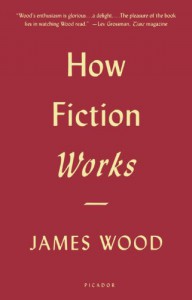 This is a literary paean to the joys of good fiction. It is a deceptively simple title. It is really a guided tour of various works, and Wood delights in explaining what is extraordinary about devices or passages used in these stories. Sometimes he also takes pains to describe what doesn't work, being famously disappointed with Updike's The Terrorist, for instance. The greatest pleasure was to admire Wood's own wonderful stylings and prose.
This is a literary paean to the joys of good fiction. It is a deceptively simple title. It is really a guided tour of various works, and Wood delights in explaining what is extraordinary about devices or passages used in these stories. Sometimes he also takes pains to describe what doesn't work, being famously disappointed with Updike's The Terrorist, for instance. The greatest pleasure was to admire Wood's own wonderful stylings and prose.













